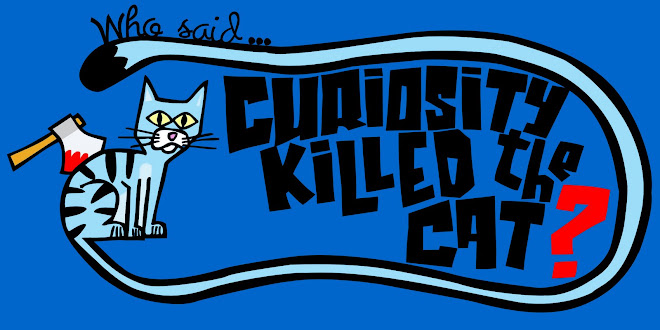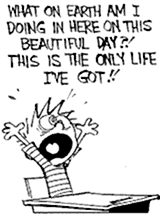Interestingly, the day after this incident I was having a beer with an acquaintance who steered the subject of our conversation to my environmental activities. In between odd I-feel-I- should-tell-yout-this-for-your-own-sake smiles, she told me that devoting such a fair share of my limited free time to
the environment was
very nice, but why didn't I try channelling my energy towards more
useful causes? I inquired what those
causes would be. She said - well, helping
people not just, you know,
animals and flowers and stuff. I could not help but wonder how such views had made it into the 21st century.
I mentioned these two incidents over coffee with a University student specializing in climatology. He did not flinch.
Believe it or not, there are still loads of people who believe thousands of high-level scientists got it wrong or were bribed into drafting the IPCC reports. And there's an even larger number of people who don't know these reports have been written let alone what they contain. He said the IPCC had contacted the authors of the Great Global Warming Swindle, for instance, the TV series which caused quite a stir when it was screened by the BBC, asking them to demonstrate their theories in more scientific, methodological terms. They had declined the invitation. The fact of the matter, he explained, is that of course there is still a degree of scientific uncertainty regarding the role of
aerosols or the exact impact of
albedo for instance, but the scientific community is unanimous about the
unequivocal (this being the term used in the latest IPCC report) warming of the earth's surface and its cause - human activity. He added that it was pretty normal that people in different parts of the world and with varying degrees of scientific knowledge still shunned the verdict implicit in such a statement.
It's scary, that's all.Of course it is in the people's right to doubt, question and criticise. The question is why not believe the conclusions of thousands of experts? If you won't believe them, then whom are you going to believe? The Essos, the Totals, the Monsantos, the Arevas, the Bushes and the Rajoys? Is it just because it's scary? Or is it out of sheer indifference? Is it possible that the human being has evolved into a species that does not give a hoot in hell about its own survival?
Even setting the climate issue aside for a second, how come so many people in 2008 still fail to understand or acknowledge the importance of sound environmental practices? Let us imagine for one second that we are all being duped by this global scientific and political conspiracy and that in reality we are not
cooking the climate. Well, there still are other extremely important environmental issues that need to be addressed urgently. Deforestation, desertification, the loss of biodiversity and the extinction of species, air, sea and river pollution, soil erosion, the dangers of using nuclear energy and storing its waste, the impacts of GMOs, dioxins and toxic chemicals and so much more.
Guardian environment editor John Vidal described 2006 as
the year the world woke up, environmentally speaking - the year governments and citizens at large took stock of the problem and its potential consequences. Indeed, one can argue that up to a certain extent there is more debate, the media have taken a liking to the subject and politicians of all hues and inclinations pander to sensationalism and public fears. You can stick eco- or bio- to any given word and it will make it more politically correct, prettier, more acceptable. There is more information, although one could argue that the information provided is still too often confused, warped, manipulated or simply sterilized.
Apart from the ecologists and the hardcore skepticals, we are left with a developed world (what an ugly expression!) in which people seem to be suffering from mass confusion. There are those who live in fear of an imminent
The day after scenario (scientific gibberish), others who, having shortly succumbed to the Al Gore trance, decided to do their bit for the environment and separate their waste (but please don't come asking for more). There are the indifferent and the defeated, those who whinge in their armchairs and those who nurse their guilt in organic restaurants. There are those who dismiss anything related to the topic with a brisk wave of the hand and a jovial
Oh we're all gonna die anyway so might as well enjoy life while we're at it.I certainly do not wish to sound condescending, but if it is true that the citizens of this world are more
aware, then when, if ever, can we realistically expect a change in behaviour, in mentality, in consumption patterns? If the global conscience has really been stirred, then why do so many people still frown upon green NGOs? And most importantly - and here I get to my point (sorry for the rambling, the weather's crap again!) - why do people still talk about doom-mongering?
Well, to the father of the little girl with the mousey hair and to the beer-guzzling, complacent acquaintance, this is what I should have said. Taking action to preserve the environment is no longer, and indeed has never been, about hugging trees and saving Willy. It is not only and exclusively about protecting cuddly animals and pretty flowers (although nobody denies the importance of protecting biodiversity, of course). It even goes beyond preserving the ice shelves and keeping forests alive. Protecting the environment is about life itself - your life. If you don't buy the 2 to 6 degree temperature rise and its effects, if you don't really care about life on earth in a few hundred years' time or if you believe technology will come to our rescue once we've burnt all our fossil fuels and depleted our dirty uranium stocks, well, then consider what pollution and collective ignorance and laissez-faire are doing to your own health right now. Consider the social impact natural disasters are already having. Even without thinking about the water nomads in Africa or the tsunami victims in Asia, spare a thought for the cancer patients in the hospital around the corner. It's not much fun, eh. Granted. But it's real.
Indeed, this is probably the missing link, the scary story the media won't write about, the issue political parties do not bring up, the silent truth people don't even think of when they cast their votes, the
blind spot in the EU's priorities. Public health. The impact of the PCBs in our rivers, the GMOs in our plates, the fine particles in our air, in our lungs ... the list is long, the cycle infinite.
We can blame our governments for not taking the appropriate measures to protect our health and our planet. But aren't we also indirectly to blame for that? Why do we keep voting for parties with no environmental programmes, why do we re-elect governments with disastrous environmental records? Can we really say
Nobody told me when the IPCC reports are so easily accessible on the Internet and despite the fact that NGO activists have been ringing the alarm bell for over 30 years? In the end, it all boils down to education, doesn't it? Information, statistics, data. You cannot decide whether you believe climate change is a reality or a conspiracy unless you read, learn, ask. It takes time, but the price of indifference has become too high. Information is the best immunization against indifference. Know your facts. Change your ways. Allow yourself to believe in a cleaner, healthier future for all.
Enviornmental awareness-raising is not doom-mongering. It is the incarnation of hope.
 Forty years after King's death, the ability of America to both mythologise the man and marginalise his meaning is all too cruelly apparent. His symbolic likeness is effortlessly incorporated into America's self-image as the land of relentless progress. Meanwhile, his legacy of struggling against poverty and imperialism is undermined with every passing day. Had he lived he would most certainly have been loathed. In order for America to love him, he first had to die.
Forty years after King's death, the ability of America to both mythologise the man and marginalise his meaning is all too cruelly apparent. His symbolic likeness is effortlessly incorporated into America's self-image as the land of relentless progress. Meanwhile, his legacy of struggling against poverty and imperialism is undermined with every passing day. Had he lived he would most certainly have been loathed. In order for America to love him, he first had to die.












